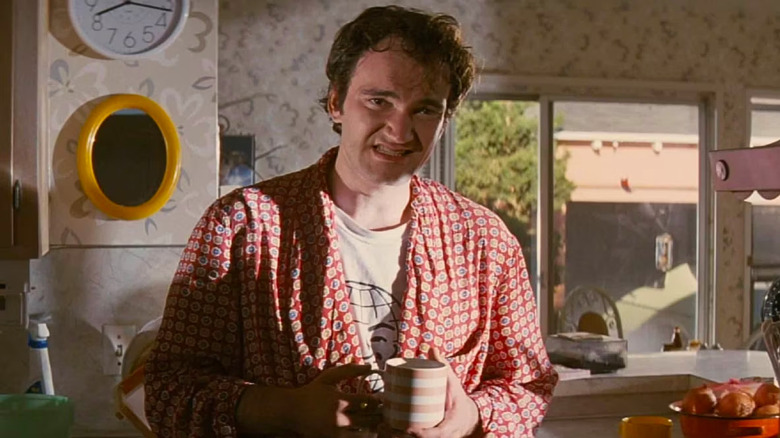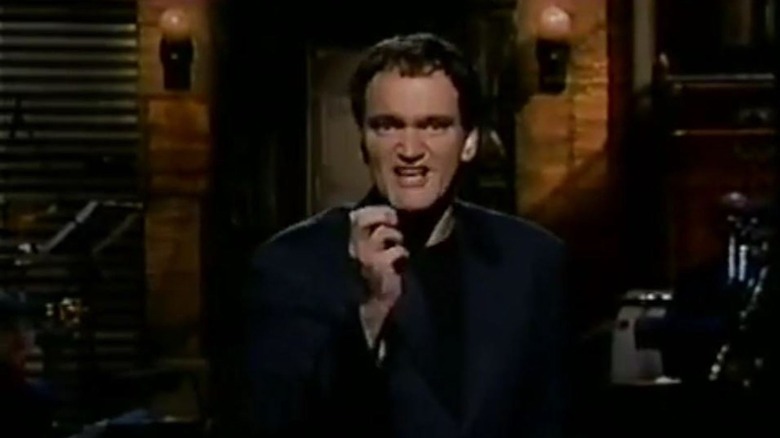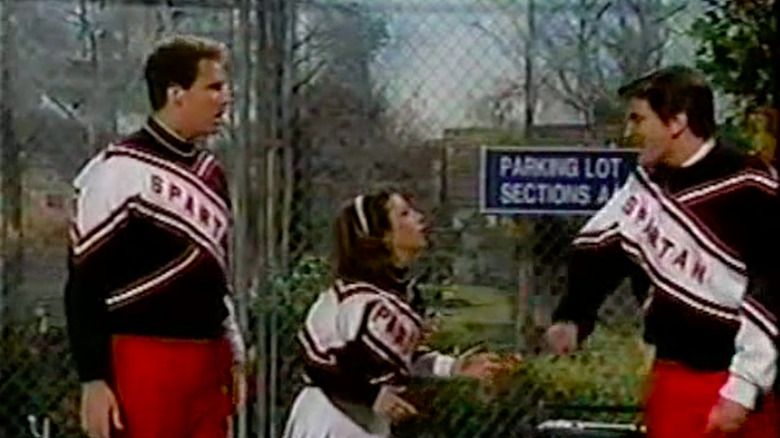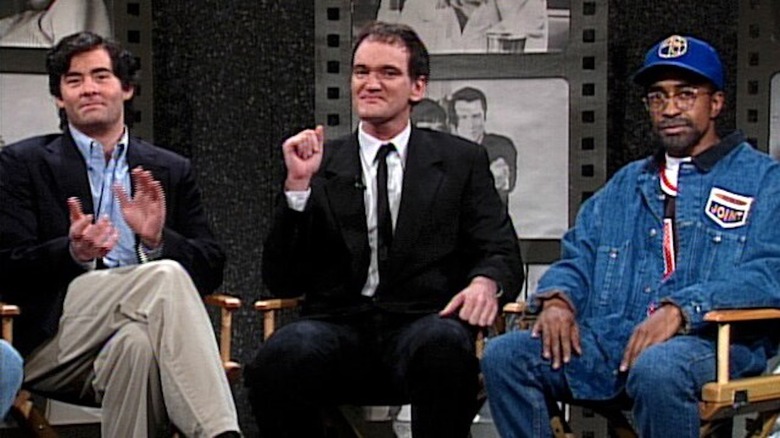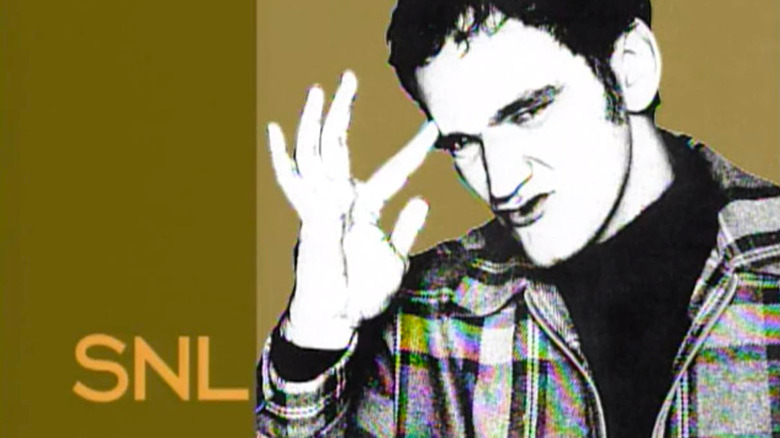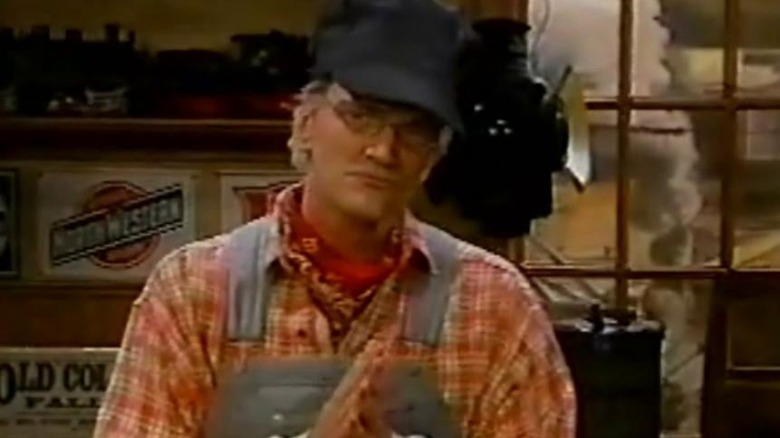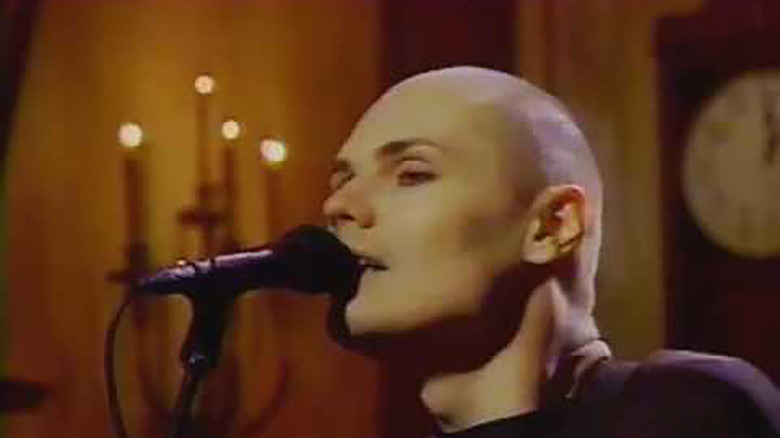Quentin Tarantino Was The Rare Director To Host SNL – But How Was His Episode?
If you didn't know Quentin Tarantino hosted "Saturday Night Live" in the 1990s, and had to guess when he took the Studio 8H stage, your best options would be early 1995 (when the zeitgeisty "Pulp Fiction" was speeding toward an Academy Awards showdown with "Forrest Gump"), early 1996 (to promote "From Dusk till Dawn") or late 1997/early 1998 (in support of "Jackie Brown"). None of these would be correct.
No, the brash indie filmmaking sensation guested on November 11, 1995, with nothing to promote but himself. This might seem peculiar now, but it made perfect sense at the time because, after the Oscars, Tarantino was hitting the talk show circuit harder than Don Rickles. Could you blame him? He'd skyrocketed from know-it-all video store clerk to generational filmmaking genius. The problem here was that Tarantino knew he was a genius before critics and fans started telling him so. As a result, he felt free to run off at the mouth about any topic at any time, which would eventually land him in hot water.
He had not, however, worn out his media welcome when SNL came calling in '95. In fact, at the time, SNL needed QT way more than he needed them. The TV institution had just barely survived a disastrously unfunny season that, according to Lorne Michaels, brought the show to the brink of cancellation. SNL hadn't been this culturally irrelevant since 1986, so booking a director who basically was the culture at that moment — and loved being in front of the camera (though not to act full time) — made perfect sense.
How did it go? It's generally your standard hit-or-miss episode of SNL, but there's one sketch I imagine the filmmaker would like to bury forever, because it's Exhibit A for everything his detractors loathe about him.
Tarantino visits an SNL in disarray
Tarantino's gig was the fifth episode of a season that had undergone a massive casting overhaul, and, thus far, it had been a rough, uncertain transition. Of the six new stars, only Will Ferrell, Cheri Oteri, and Darrell Hammond seemed destined to stick around for a long run (provided one was in the offing). So Tarantino was going to get a workout if he was up to it.
He was. And that's fine for the most part.
After an uninspired cold open where Hammond's Bill Clinton, smarting from sagging approval ratings, eats his feelings in the White House kitchen while calling notable critics of his administration (e.g. Jesse Jackson and Colin Powell) at 2:30 AM to pathetically curry favor, Tarantino explodes onto the stage for his opening monologue. It's a supercharged moment because Tarantino's public shtick is all about knowing film and television history better than anyone on the planet. Surely, he'll attempt something ballsy rather than fall back on one of the hoary, prefab routines reserved for hosts who can't do comedy.
So it's a tad disappointing when, after boasting that he's going to perform a tribute to "the greatest moment in the history of television," Tarantino breaks into song. Though he puts a silly Tarantinoesque spin on the old host-not-known-for-singing-sings bit by belting an obscure rocker ("I'm Gonna Blow You a Kiss in the Wind") from a sixth-season episode of "Bewitched," the joke dies before he can finish gesticulating like a coked-up karaoke bar regular. And yet this is also in keeping with Tarantino's for-hire m.o. When he directed episodes of "E.R." and "CSI," he mostly worked within the stylistic constraints of each show because to get too ostentatious would be to kill everything he loved about them.
Thus your expectations are set: there will be no reinvention of the SNL formula this evening. QT is strictly a team player. And he plays enthusiastically well with others throughout. Save for that one sketch, which we'll get to.
QT's got Spartan spirit!
Speaking of television history, Tarantino can brag that he appeared in the very first "Spartan Cheerleaders" sketch alongside Will Ferrell and Cheri Oteri. As the first time through on a skit that, given its prominent post-monologue placement, Michaels clearly viewed as a potential recurring piece, Ferrell and Oteri oversell every joke. The initially hesitant audience ultimately buys in, and Tarantino gets a big laugh when he makes his wildly exuberant entrance. If nothing else, the filmmaker has proven he can hang with two of the most talented members of the new cast.
Next up is "Clara Turley's Bible Challenge," a one-joke game show sketch where Nancy Walls' host asks the three contestants (Tarantino, Molly Shannon, and Norm MacDonald) bible history questions, gives them the answer and asks if they knew the answer. Tarantino and Shannon — as devout, unfailingly honest Christians — repeatedly, sheepishly admit they did not know these pieces of Good Book trivia, while MacDonald's returning champion, Stan Hooper (a church handyman who smokes and scarfs down MacDonald's throughout the game), dishonestly claims he did know the answer. He continues to do this throughout, piling up cash and, once again, walking away victorious.
Then SNL gives QT the opportunity to go full QT, and the man is damn lucky there was no social media in 1995.
Directors on Directing
While promoting "Pulp Fiction," Tarantino had quickly and quite loudly established himself as a loquacious on all matters cinematic. He was already talking up semi-obscure grindhouse fare like John Flynn's "Rolling Thunder," and voicing contrarian opinions with aplomb. QT was a lot, but because we dug "Reservoir Dogs" and "Pulp Fiction," we rolled with QT's rat-a-tat, from-on-high hot takes. He was basically Peter Bogdanovich on bennies.
Tarantino brought this rep into the "Directors on Directing" sketch, a classic SNL panel bit where the filmmaker hosts a roundtable discussion with Spike Lee (Tim Meadows), Oliver Stone (Koechner) and Gus Van Sant (McKinney). There are three strong personalities here in QT, Lee and Stone, so you might expect comparably laidback Van Sant to be the sane voice in a titanic clash of director egos.
I've no idea who wrote the sketch and to what degree Tarantino participated in that process, but I can't imagine a worse approach than positioning him as the bad boy provocateur who turns the combative Lee and Stone into shrinking violets – outside of playing him as a provocateur desperate to know if these filmmakers have abused their power in a sexual manner. Alas, this is precisely what they did.
Did you jam her?
Tarantino starts with Lee, lewdly asking if he capitalized on Kim Basinger's impassioned defense of the snubbed "Do the Right Thing" at the 1990 Academy Awards by "jamming" her. He then turns to Stone, and, citing his support of the Asian-American community, queries as to whether he's jammed women of this descent (during this interrogation, he pleads with Stone to "call a spade a spade," at which point he mock apologizes to Lee). After Van Sant explains that he did not jam Keanu Reeves because his "My Own Private Idaho" star is straight, the directors pressure Tarantino on Uma Thurman. Did he jam her? Tarantino emphatically avers that he'd jam every woman on the set.
Context is key here, as is a sense of proportion. Tarantino was playing a parody of a hedonistic, power-mad director. He was also living in a bubble of exaltation at the time, and had yet to be humbled (or at least grow up). Does the cartoonish licentiousness of his character in this sketch land like the Hindenburg post-Weinstein conviction? Absolutely. But QT generally has an excellent professional reputation (save for Thurman's car accident on "Kill Bill"), so, decades later, it's obvious this version of the director is just a garish caricature.
Had "Directors on Directing" left a deeper groove in the popular culture, it could've hurt Tarantino in subsequent years. Fortunately, he matured and developed a righteous streak. The twerp of this sketch, the twitchy brat who went upside Don Murphy's head in a trendy industry eatery, the doofus who affected a Black persona on "Arsenio...", that guy is thankfully gone.
Molly Shannon and Cheri Oteri get a Leg Up on QT
And he was never going to stay. Tarantino's last three sketches of the night drive this home. He's at his best in "Leg Up," a talk show hosted by veteran musical superstars Ann Miller (Molly Shannon) and Debbie Reynolds (Oteris). Playing himself again, Tarantino can only praise Reynolds because Miller was primarily a theater gal. Ultimately, his indefatigable movie-geek energy is no match for the supernova exuberance of Miller and Reynolds (who thought he was a hot new choreographer in the first place). When the duo grows bored of flattering him, they consign him to his dressing room, reclaim the spotlight, and make it all about their incandescently talented selves. It's a vital piece of self-deprecation from Tarantino, but mostly it's a testament to the comedic brilliance of Shannon and Oteri.
Tarantino's last three sketches of the night — "White Trash Around a Campfire Dealing with an Overabundance of Fluids," "Spade in America," and "All Aboard!" — address the director's predilection for gratuitous violence and, once more to tiresome effect, his meteoric rise to fame. The first segment is your typical post-Weekend Update throwaway: a one-joke premise that's strained to the snapping point in less than a few minutes. Just know that the title is the sketch, and that the primary fluid on copious display is blood. Also worth noting: it isn't funny.
"Spade in America," a (mercifully) one-season-and-done showcase for David Spade's celeb-dissing shtick, turns into a "This is Your Life" parody that purports to reunite Tarantino with important people from his past. These include SNL writer Frank Sebastiano (who evidently rented "Robocop" from the director when he was 12), his waitress from a recent visit to the infamous (and long-since-shuttered) NYC strip club Scores (she no-shows because Saturday's a busy night for her), and John Travolta's "Welcome Back Kotter" co-star Robert "Epstein" Hegyes (who Tarantino has never met). Though it's delightful to see Hegyes back on camera for the first time in ages, this is an uninspired bit (and Spade clearly knows it).
Really, though, it was all about Smashing Pumpkins
The final skit of QT's appearance fell flat with the studio audience, but I love it. Tarantino stars as Chester Millbrush, the kindly old host of a public-broadcast model train show. At least, he's kindly until he starts reminiscing about his rail-working days, which seem to have exclusively consisted of thrashing and murdering hobos. We soon realize Chester is a psychopath who considers everyone (from actual derelicts to doctors and priests) to be hobos.
The final verdict: throw out the noxious "Directors on Directing" sketch and this is a perfectly average SNL episode. Tarantino came ready to play and seems wholly comfortable bouncing off an impressive collection of comedy pros. He belongs and should be invited back for an encore if only on the off chance that we might get more Chester Millbrush. But in the end, the episode's highlight isn't QT at all. It is musical guest Smashing Pumpkins, who were at their creative peak promoting "Mellon Collie and the Infinite Sadness." Even if you find the host grating, you cannot deny the ragged, raging glory of "Bullet with Butterfly Wings."
